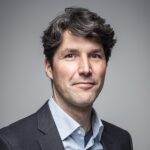Which interdisciplinary bidt studies promise remarkable results? What about quality assurance in research? And which research projects could be relevant to stakeholders in politics and business? As managing director, Christoph Egle keeps an eye on the big picture at bidt. The political scientist organises the processes that steer the institute’s research, from the strategic direction of research and determination of formats to the operationalisation of the decisions of the board of directors.
When you ask Christoph Egle about the first time he came into contact with digital transformation, the memories of his student days come flooding back. “It was in 1993 that the first popular browser came onto the market, and it was in 1994 that I began my studies in political science,” he recalls. Because the first political parties launched their websites back then, the internet became a topic in Egle‘s courses. “I found the new medium very interesting from the beginning, although I was not an early adopter,” says Christoph Egle.
After completing his doctorate and moving from university to acatech, the German Academy of Science and Engineering, Christoph Egle began working professionally on digital transformation. There, Christoph Egle provided scientific policy advice, first as a consultant and then as head of the German government’s Innovation Dialogue office. From acatech president Henning Kagermann, former CEO of SAP and inventor of the term Industry 4.0, he learned about self-organised, industrial production through networked machines. “I soaked up the ideas,” recalls Egle. “I also gained a lot of interesting insights into the people at the forefront of change in politics and business.”
Experiencing politics from the inside
In 2018, Christoph Egle was approached by the Bavarian State Chancellery to help set up the digital and media department – an exciting opportunity for him. “I wanted to see what the business of politics looks like from the inside,” he says. “In the State Chancellery, and later in the Bavarian State Ministry for Digital Affairs, I became aware of the difficult balancing processes in which politicians are constantly involved.” Bringing together different interests from different social groups is a balancing act. To this day, he likes to share this experience with friends and colleagues when they talk about the shortcomings of the political establishment. Today, as managing director of bidt, Christoph Egle has arrived at the intersection of science, politics and business – and can now put his broad experience to profitable use. For example, he recently contributed his political science expertise to a policy brief on the creation of a “digital ministry” – and made recommendations for the governance of digital policy. He also sees himself explicitly as a science manager who wants to facilitate excellent research.
I see myself as a generalist and builder of bridges.
 Dr. Christoph Egle To the profile
Dr. Christoph Egle To the profile
Technology assessment at bidt
As a father of two children, Christoph Egle also thinks a lot about the future of our world. How will the digital transformation change our society? In this discussion, he locates himself in an optimistic-realistic position. He considers horror scenarios of machines conquering the world to be nonsense. At the same time, he says, it is not a foregone conclusion that humanity will only use new technologies for good purposes.
“Our advantage is that we have a higher level of reflection than earlier societies,” says Christoph Egle. In contrast to the industrial revolution, there is now technological assessment. Institutes like bidt anticipate trends, analyse changes and make recommendations for political and economic strategies and regulatory steps.
Helping to shape change for the benefit of the people is a social and political task in which we as bidt are happy to participate.
 Dr. Christoph Egle To the profile
Dr. Christoph Egle To the profile
One example of successful anticipation of change, he said, is the bidt project on measuring opinion power and diversity on the internet. “How can media concentration be controlled in the age of digitalisation to ensure plurality of public opinion?” is how Christoph Egle summarises the research question. So far, he says, media regulation is still entrenched in the offline world. The bidt researchers around Professor Carsten Reinemann are now developing a metric to capture the power of opinion of social media platforms. Because the Bavarian Regulatory Authority for Commercial Broadcasting is also involved in the project, feedback to practice is guaranteed.






